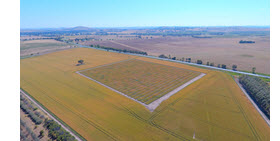Australia
November 8, 2019
Drones, remote monitoring and advanced data analytics will provide scientists unprecedented accuracy in studying crops and farming systems at the new Boorowa Agriculture Research Station, opened by Australia’s national science agency CSIRO today.
The digitally-enabled farm in southwestern NSW is equipped with 100 temperature and humidity probes, 72 soil moisture probes, and six weather stations to monitor experiments in crop science, agronomy and farming systems across its 290 hectares.
It took four years to design and build, and is an $11.5 million investment in the future of Australian farming.
RIGHT: Purpose built workshops and storage facilities at Boorowa Agricultural Research Station.
Director of CSIRO Agriculture and Food Dr Michiel van Lookeren Campagne said it was more important than ever to advance innovative science to build resilient agriculture systems and increase food production.
“Our agriculture industries are facing major challenges, especially with the current drought,” Dr van Lookeren Campagne said.
“Here at Boorowa, we’ll be trialling new varieties of wheat, canola, legumes and pastures that can withstand warmer and drier conditions, such as those predicted for the future.
“We’ll also continue to research the best farming practices to manage our fragile soils and get the most from every drop of water.”
“The better we can understand how plants grow and produce in a real farming environment – not just the lab – the more we can help Australian agriculture meet its $100 billion target.”
The new research station replaces CSIRO’s Ginninderra Experimental Station, which was established just outside Canberra in 1958.
|

|
LEFT: At Boorowa, research will be conducted into new varieties of wheat, canola, legumes and pastures that can withstand warmer and drier conditions, such as those predicted for the future.
|
“It was at Ginninderra that we field-tested a range of high yielding and disease resistant wheat varieties such as Lawson, Paterson, Gordon, Tennant, Brennan and Dennis. We also refined our high-fibre BARLEYmax and ultra-low gluten Kebari® barley,” Dr van Lookeren Campagne said.
“With this new state-of-the-art facility at Boorowa, it’s exciting to imagine what we can achieve.”
The research station was developed with support from the Grains Research and Development Corporation and the Science and Industry Endowment Fund